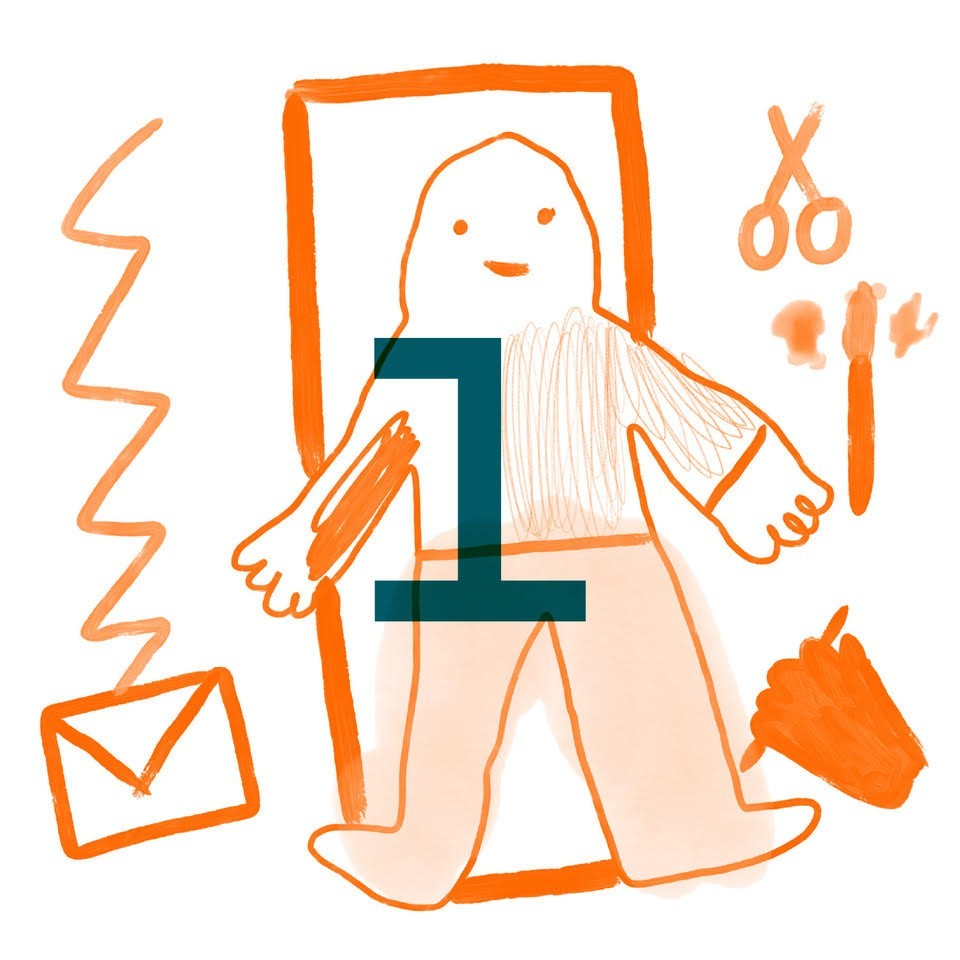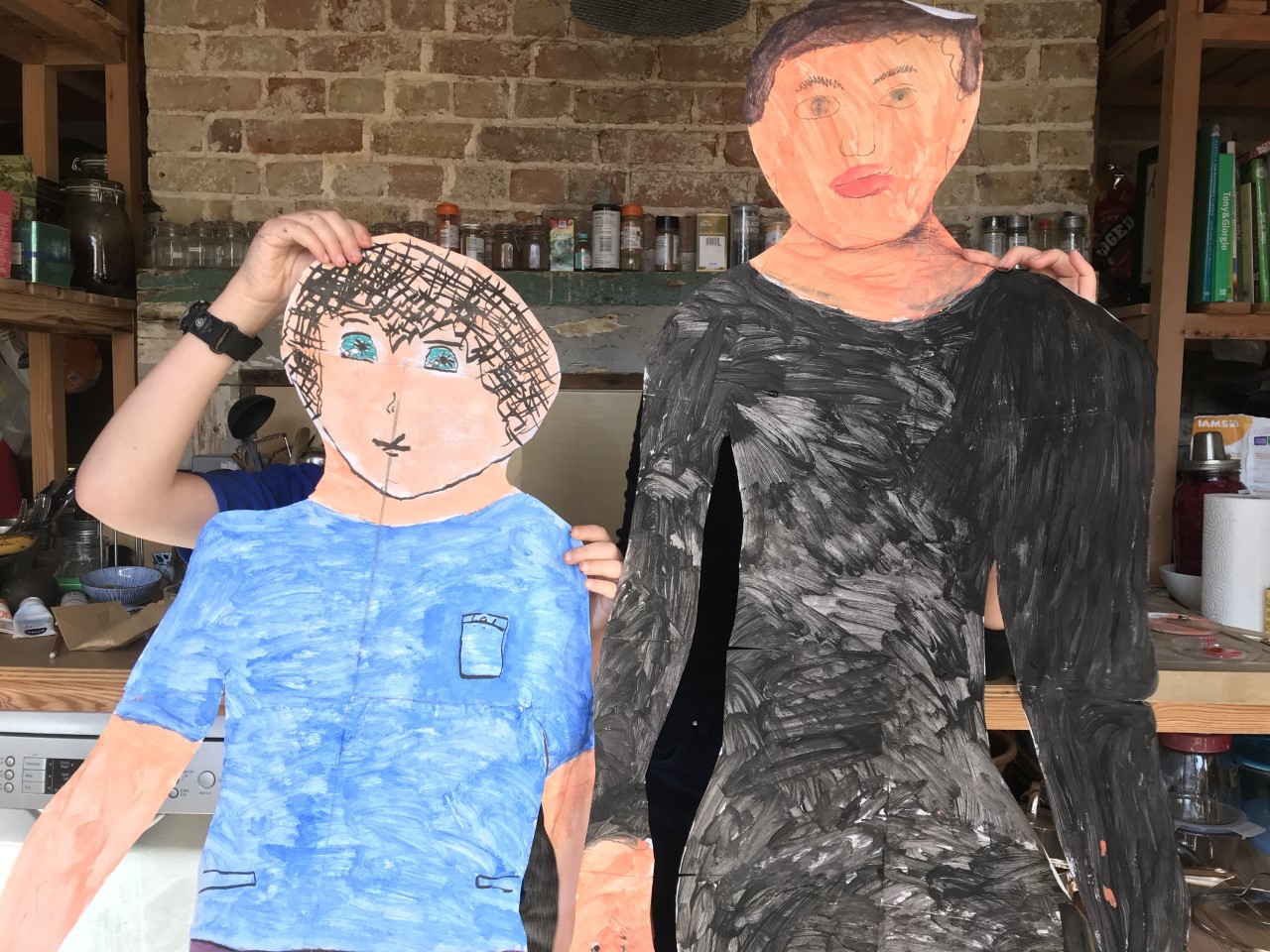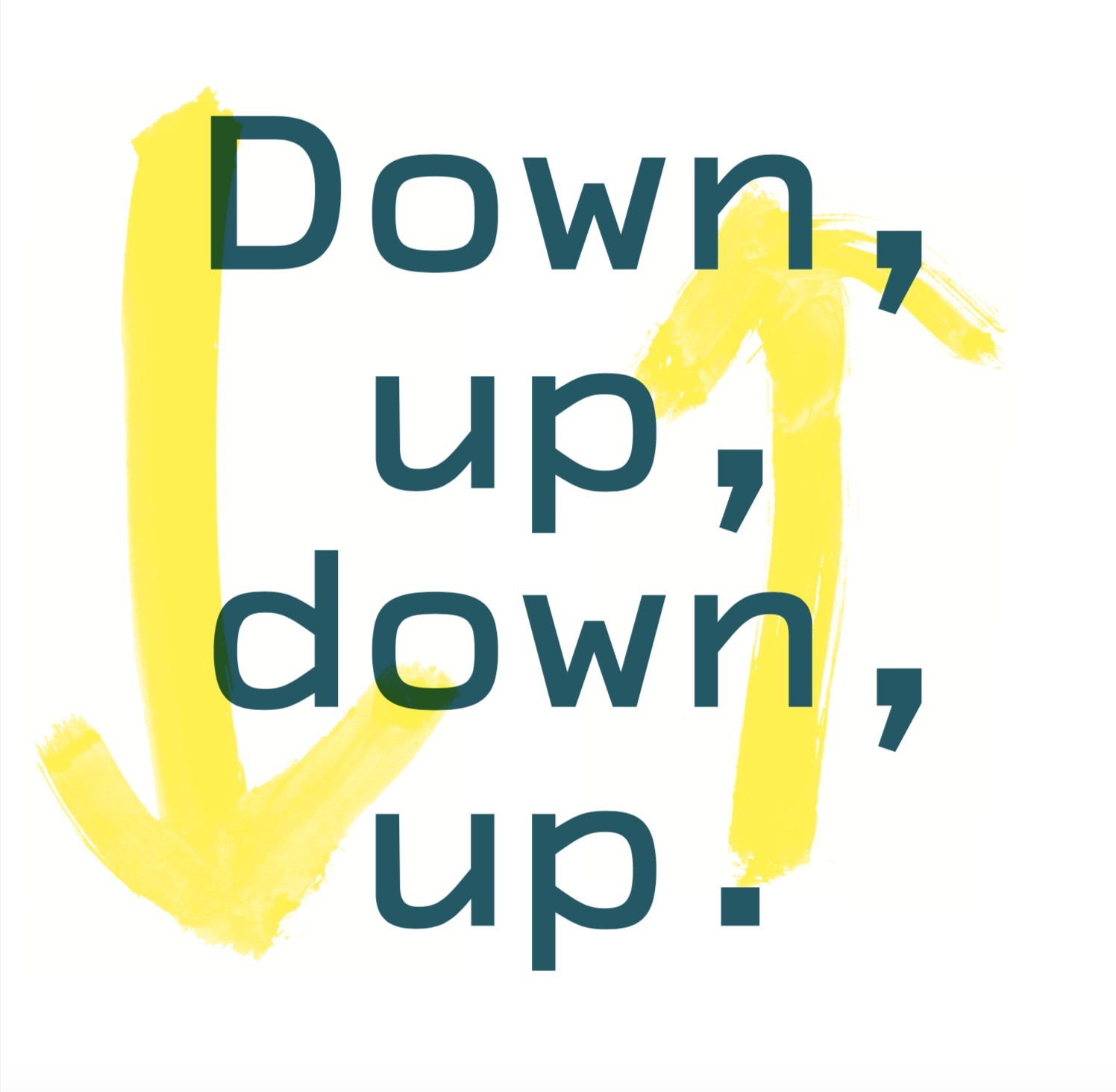TALK: Rosalie Schweiker – Down, Up, Down, Up
A conversation between CCA’s Engagement Curator Trish Scott and artist Rosalie Schweiker about Down, Up, Down, Up, a ‘social’ social distancing school, established in March 2020 in response to covid-19 school closures. The project sets creative activities for families and young people each week via @down_up_down_up . For more information on this and other Education programming click here.
Trish: In the run up to school closures I’d been contemplating the reality of home-schooling an 8 year old, whilst juggling work, feeling somewhat bewildered by the volume (and complexity) of many online resources, and started to think about something simple and community oriented, that didn’t need equipment, technology or a printer to make it viable.
Rosalie: Yes, I’d hope that you could come at all of these activities in your own time and in your own way, they are meant to give you permission and energy, not pressure.
How has it been working for you, now that we’re in week 2 of homeschooling?
T: OK (relatively speaking). My partner’s freelance work has nearly all been cancelled so he’s had time on his hands. I have a lot of questions re: schooling in terms of what we’re being expected to do and why and for whose benefit. I’m also overwhelmed by the volume of additional tools/resources that have sprung up, just since we started this project.
R: Yes, totally agree! Now even Anthony Gormley wants me to make his art my own home. No, thanks. It’s as if artists think they are the only people who have ideas…haha…but I guess if being busy and overproduction is our drug in the arts, then it’ll take more than a pandemic lockdown to get us out of this habit.
And that’s where I have blind spots, so when you rang me up I was super excited and we’re both like: ‘Yes, let’s do this !!!’ and quickly set it up … all in a matter of days while the world is imploding around us. And now I’m like: ‘This is great, this is fun!’ and on the other hand I’m thinking, ‘WTF am I doing, I’m just keeping busy, why am I becoming a part of this art world digital content overload’… it’s tricky. In the end, all my other work has got cancelled, so the £150 a week from this project means I’ve got at least something coming in and a few other people are also getting paid.
T: I initially got in touch because I was thinking about your publication ‘Teaching for people who prefer not to teach‘ in relation to all the millions of parents/carers who have suddenly been thrust into the role of teachers (and would prefer not to). Plus the way the home features in your practice, e.g. ‘Why do it Tate if you can do it in your living room? ‘. I also remember us having a conversation years ago about Harrell Fletcher and Miranda July’s project, ‘Learning to Love you more’ , and this coming to mind as something it could be good to revisit during lockdown.
What are your thoughts on where Down, Up, Down, Up sits within a broader ecology of practices (and in relation to your own)?
R: Institutions usually ‘include’ my work through their education programmes or their public programming, that’s often the only way it makes sense to them, so this kind of fits the pattern. I think Down, Up, Down, Up is also quite typical, because it’s a quick response, but it’s based on long-term relationships – we’ve known each other for ten years, we’ve worked together before, so we trust each other. And my first thought when you called was: ‘Who could I share this with? Would this be a good excuse to stay in touch with somebody?’ And so I’ve asked Mia Frostner from Europa who is an amazing graphic designer. And then I asked Ben Messih and Sadie St Hilaire who run the Big Family Press, which is a great riso printing press for kids and families that was set up by One of My Kind (OOMK) at the South London Gallery. Sadie and I met at Rabbits Road Press, another OOMK project. Sadie makes incredible drawings and we’ve got a shared understanding. We’re the courgettes hiding amongst the cucumbers.
T: It’s great that this is evolving as a collaboration. Plus strength in numbers feels particularly important at this time!
I’ve been reading the reports from Italy talking to us from ‘the future’ and finding them spookily accurate. It’s interesting to be doing this project whilst living through a collective trauma. For me what feels important and relevant shifts so dramatically and quickly from day to day. What are your reflections on working in/through corona time (is that a thing?) and the relative place/time of this project – (and what the title alludes to in that respect?)
R: The title Down, Up, Down, Up actually comes from a writing exercise which Mia’s child has to do, it’s like how you learn to write a ‘W’. But it’s very much also how I feel right now.
Generally, I feel that everything that was shit before is now doubly shit and everything that was good is now extra good. So, all the people who didn’t care before care even less now and are just obsessed with their own survival and how to stay relevant. They can only think in scarcity and competition, so their response is to do business as usual on speed. But the good stuff, all the grassroots campaigns, the community gardens, the friendships, unions, informal work collectives, co-ops – we all want to survive this with everybody, not just with the strongest.
T: I’m interested in how we might support a community to form around Down, Up, Down, Up. It would be great if there’s an element of exchange – i.e. people sharing responses. Realistically though I think the tasks will probably be accessed by people in their own time at their own pace.
R: Yes, I think we shouldn’t fall into this trap where we measure impact by numbers or likes. But on the other hand, we need to think and work a bit more on how to get into a conversation with people, rather than posting at them.
T: And for the project to evolve responsivly and meet people where they are at.
On that note I love the ‘watch loads of TV’ task because (for me) it does just that. It’s not about adding to what we should be doing, but starts with the reality of what many of us are actually doing to make it through these days!
R: I think what I’d love to do more as we grow this is to think about all the things which school isn’t teaching very well for various reasons. I work a lot in schools usually and they are extremely underfunded and often traumatising places, especially for kids and teachers that don’t fit in with the Michael Gove values.
T: At the moment I’m constantly shifting between an urge to pause and take stock of all that is out of balance and needs to change, and an urge to do-do-do.
R: Yes, totally. There’s a massive cognitive dissonance, where I’m worrying about if I got this insta story right, knowing at the same time that there are people out there who don’t know how to feed their kids. But I don’t think it’s either / or. It’s not like ‘Stop making art, grow food instead’. It should be ‘how do we connect the two?’
T: What is being revealed for you? Do you think there’s going to be a shift in the role/value that artists and art institutions play, in response to this pandemic?
R: I think as long as institutions are led by the people who are leading them now, not much will change. They will just reform, but never change the structures, because it would mean they would have to share. So their focus will be on shifting to digital when actually we need to radically shift to redistribution. It’s all like: ‘Oh, look – David Hockney managed to do a painting in these difficult times, why don’t you get creative…’- ‘Maybe because I don’t have an ipad and need to queue 4 hours to get into Asda?!?’ It’s just not real. My friend Sahra Hersi said people need stay at home and leave la la la land. I think that’s sound advice.
A conversation between CCA’s Engagement Curator Trish Scott and artist Rosalie Schweiker about Down, Up, Down, Up, a ‘social’ social distancing school, established in March 2020 in response to covid-19 school closures. The project sets creative activities for families and young people each week via @down_up_down_up . For more information on this and other Education programming click here.
Trish: In the run up to school closures I’d been contemplating the reality of home-schooling an 8 year old, whilst juggling work, feeling somewhat bewildered by the volume (and complexity) of many online resources, and started to think about something simple and community oriented, that didn’t need equipment, technology or a printer to make it viable.
Rosalie: Yes, I’d hope that you could come at all of these activities in your own time and in your own way, they are meant to give you permission and energy, not pressure.
How has it been working for you, now that we’re in week 2 of homeschooling?
T: OK (relatively speaking). My partner’s freelance work has nearly all been cancelled so he’s had time on his hands. I have a lot of questions re: schooling in terms of what we’re being expected to do and why and for whose benefit. I’m also overwhelmed by the volume of additional tools/resources that have sprung up, just since we started this project.
R: Yes, totally agree! Now even Anthony Gormley wants me to make his art my own home. No, thanks. It’s as if artists think they are the only people who have ideas…haha…but I guess if being busy and overproduction is our drug in the arts, then it’ll take more than a pandemic lockdown to get us out of this habit.
And that’s where I have blind spots, so when you rang me up I was super excited and we’re both like: ‘Yes, let’s do this !!!’ and quickly set it up … all in a matter of days while the world is imploding around us. And now I’m like: ‘This is great, this is fun!’ and on the other hand I’m thinking, ‘WTF am I doing, I’m just keeping busy, why am I becoming a part of this art world digital content overload’… it’s tricky. In the end, all my other work has got cancelled, so the £150 a week from this project means I’ve got at least something coming in and a few other people are also getting paid.
T: I initially got in touch because I was thinking about your publication ‘Teaching for people who prefer not to teach‘ in relation to all the millions of parents/carers who have suddenly been thrust into the role of teachers (and would prefer not to). Plus the way the home features in your practice, e.g. ‘Why do it Tate if you can do it in your living room? ‘. I also remember us having a conversation years ago about Harrell Fletcher and Miranda July’s project, ‘Learning to Love you more’ , and this coming to mind as something it could be good to revisit during lockdown.
What are your thoughts on where Down, Up, Down, Up sits within a broader ecology of practices (and in relation to your own)?
R: Institutions usually ‘include’ my work through their education programmes or their public programming, that’s often the only way it makes sense to them, so this kind of fits the pattern. I think Down, Up, Down, Up is also quite typical, because it’s a quick response, but it’s based on long-term relationships – we’ve known each other for ten years, we’ve worked together before, so we trust each other. And my first thought when you called was: ‘Who could I share this with? Would this be a good excuse to stay in touch with somebody?’ And so I’ve asked Mia Frostner from Europa who is an amazing graphic designer. And then I asked Ben Messih and Sadie St Hilaire who run the Big Family Press, which is a great riso printing press for kids and families that was set up by One of My Kind (OOMK) at the South London Gallery. Sadie and I met at Rabbits Road Press, another OOMK project. Sadie makes incredible drawings and we’ve got a shared understanding. We’re the courgettes hiding amongst the cucumbers.
T: It’s great that this is evolving as a collaboration. Plus strength in numbers feels particularly important at this time!
I’ve been reading the reports from Italy talking to us from ‘the future’ and finding them spookily accurate. It’s interesting to be doing this project whilst living through a collective trauma. For me what feels important and relevant shifts so dramatically and quickly from day to day. What are your reflections on working in/through corona time (is that a thing?) and the relative place/time of this project – (and what the title alludes to in that respect?)
R: The title Down, Up, Down, Up actually comes from a writing exercise which Mia’s child has to do, it’s like how you learn to write a ‘W’. But it’s very much also how I feel right now.
Generally, I feel that everything that was shit before is now doubly shit and everything that was good is now extra good. So, all the people who didn’t care before care even less now and are just obsessed with their own survival and how to stay relevant. They can only think in scarcity and competition, so their response is to do business as usual on speed. But the good stuff, all the grassroots campaigns, the community gardens, the friendships, unions, informal work collectives, co-ops – we all want to survive this with everybody, not just with the strongest.
T: I’m interested in how we might support a community to form around Down, Up, Down, Up. It would be great if there’s an element of exchange – i.e. people sharing responses. Realistically though I think the tasks will probably be accessed by people in their own time at their own pace.
R: Yes, I think we shouldn’t fall into this trap where we measure impact by numbers or likes. But on the other hand, we need to think and work a bit more on how to get into a conversation with people, rather than posting at them.
T: And for the project to evolve responsivly and meet people where they are at.
On that note I love the ‘watch loads of TV’ task because (for me) it does just that. It’s not about adding to what we should be doing, but starts with the reality of what many of us are actually doing to make it through these days!
R: I think what I’d love to do more as we grow this is to think about all the things which school isn’t teaching very well for various reasons. I work a lot in schools usually and they are extremely underfunded and often traumatising places, especially for kids and teachers that don’t fit in with the Michael Gove values.
T: At the moment I’m constantly shifting between an urge to pause and take stock of all that is out of balance and needs to change, and an urge to do-do-do.
R: Yes, totally. There’s a massive cognitive dissonance, where I’m worrying about if I got this insta story right, knowing at the same time that there are people out there who don’t know how to feed their kids. But I don’t think it’s either / or. It’s not like ‘Stop making art, grow food instead’. It should be ‘how do we connect the two?’
T: What is being revealed for you? Do you think there’s going to be a shift in the role/value that artists and art institutions play, in response to this pandemic?
R: I think as long as institutions are led by the people who are leading them now, not much will change. They will just reform, but never change the structures, because it would mean they would have to share. So their focus will be on shifting to digital when actually we need to radically shift to redistribution. It’s all like: ‘Oh, look – David Hockney managed to do a painting in these difficult times, why don’t you get creative…’- ‘Maybe because I don’t have an ipad and need to queue 4 hours to get into Asda?!?’ It’s just not real. My friend Sahra Hersi said people need stay at home and leave la la la land. I think that’s sound advice.
Read Less...


